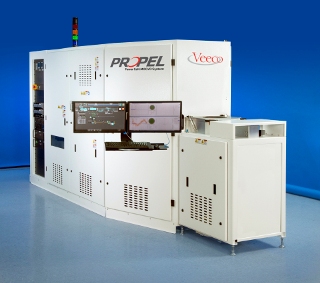Nov 21 2014
Veeco Instruments Inc. introduced today the Propel™ Power Gallium Nitride (GaN) Metal Organic Chemical Vapor Deposition (MOCVD) system, which incorporates single-wafer reactor technology for outstanding film uniformity, yield and device performance.
 Veeco's new Propel Power GaN MOCVD system enables the development of highly-efficient GaN-based power electronic devices that will accelerate the industry's transition from R&D to high volume production. (Photo Credit: Business Wire)
Veeco's new Propel Power GaN MOCVD system enables the development of highly-efficient GaN-based power electronic devices that will accelerate the industry's transition from R&D to high volume production. (Photo Credit: Business Wire)
This new 200mm MOCVD system and technology enables the development of highly-efficient GaN-based power electronic devices that will accelerate the industry’s transition from R&D to high volume production.
In response to strong consumer demand for power electronic devices, gallium nitride MOCVD is advancing a new generation of power switching devices that feature higher efficiency, smaller form factors and lower device weight. According to IHS Research, the GaN power electronics market is expected to grow at greater than ninety percent compound annual growth rate from 2014 to 2020 as new devices are applied to consumer electronics, solar and wind power, power supplies, automotive and other applications.
“Leading power electronics manufacturers are currently progressing from R&D to pilot production, developing and qualifying novel device structures with a focus on improved reliability, yield and cost,” said William J. Miller, PhD., Executive Vice President, Veeco. “As the world’s leader in GaN MOCVD equipment, the Propel system is the answer for the next generation of power electronic devices.” Miller added, “With its superior design, technology and performance, Propel is a platform that will provide exciting future growth opportunities for our customers and for Veeco.”
The Propel MOCVD system is based on Veeco’s industry leading MOCVD TurboDisc® technology and features long campaign runs and low particle defects for exceptional yield and flexibility. In addition, the proprietary SymmHeat™ technology drives uniform thermal control for excellent thickness and compositional uniformity. Providing a seamless wafer size transition, the system deposits high quality GaN epitaxial layers on silicon wafers that are six and eight inches in diameter.
“Beta testing by power electronics industry leaders has shown that the Propel system is ideally suited for fast cycles of learning with excellent particle performance,” said Jim Jenson, Senior Vice President and General Manager of Veeco MOCVD. “This validation is great news for customers as they work to develop innovative processes and technologies for their product roadmaps. As we’ve demonstrated in the LED industry, Veeco’s goal is to help power electronics customers also improve device efficiency, reduce manufacturing costs, and ultimately move into high-volume manufacturing.”